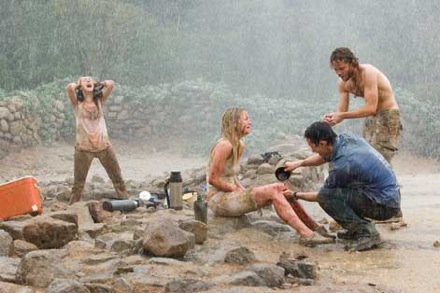 In writer/star Jason Segel's FORGETTING SARAH MARSHALL, super-producer Judd Apatow's clan finally comes completely into their own. Not that Seth Rogen's SUPERBAD wasn't great, or that his upcoming PINEAPPLE EXPRESS doesn't look like a hell of a good time, but Segel's little wonder of a movie ventures outside the usual tropes of his mentor and settles firmly into its own take on the Apatow brand. But fret not, there's still plenty of raunch, bit parts by all the regulars, and also some gratuitous male nudity; humiliating, emasculating, and really funny male nudity.
In writer/star Jason Segel's FORGETTING SARAH MARSHALL, super-producer Judd Apatow's clan finally comes completely into their own. Not that Seth Rogen's SUPERBAD wasn't great, or that his upcoming PINEAPPLE EXPRESS doesn't look like a hell of a good time, but Segel's little wonder of a movie ventures outside the usual tropes of his mentor and settles firmly into its own take on the Apatow brand. But fret not, there's still plenty of raunch, bit parts by all the regulars, and also some gratuitous male nudity; humiliating, emasculating, and really funny male nudity.The film concerns Peter Bretter (Segel), composer for the CSI-like show on which his girlfriend, the titular Sarah (Kristen Bell), works. The first scene is a breakup, with Peter in the buff, while he is dumped, underscoring painfully the helpless feeling one gets from being told by the person they love that they no longer want to be with them. Also, it's a really good laugh. In any case, Peter goes through a pretty deep depression, and with guidance from his step-brother, decides to go off on a trip to Hawaii to get a fresh perspective. Needless to say, he arrives only to find that Sarah and her new squeeze, British rocker Aldous Snow (Russell Brand), are also at the resort. He decides to stay, and that's when the story really picks up and transforms into the story of Peter meeting Rachel (Mila Kunis), the hotel concierge who hooks him up with a room he could never afford, and begins to take a liking to him.
Though the story has been told at least a million times in movies, I felt like this take was almost completely fresh. Of course, the biggest asset to Apatow's movies, either as producer or as the sole creating partner is that he is able to take material that is in no way new or innovative, and inject it with so much believability, wit, raunch, and heart that it is entirely infectious. I know the man has his detractors, but I'm so not one of them. And when a movie about really obscenely rich people taking holidays in Hawaii makes me care about the characters in any way, and doesn't make them all seem like vapid assholes, I know it's something special.
I like the style of Segel's humor on display in FORGETTING SARAH MARSHALL. It doesn't rely solely on any one thing, and shows a rather broad range, from shocking and rude, to sweet and subtle: a smirk here, a penis there. There's something for everyone here. And don't even get me started on the prominence of puppets. When you see the movie, it should come as no surprise that Segel has pitched a new Muppet movie to Disney and is toiling away on the screenplay as we speak. "Snuffleupagus fucks my shit up" may be the funniest thing I hear a side character say all year. The cast is perfect as well, with just enough of the Apatow troupe to keep things funny without getting tiresome. Bill Hader, Jonah Hill, Paul Rudd, Da'Vone McDonald and 30 ROCK's Jack McBrayer all turn in some memorable work and all have their moments to shine.
Segel, Kunis and Bell are wonderful, and each has a very clear talent with comic timing (as anyone who has ever seen their television work well knows) and a certain level of believability in their characters. The standout performance, though, is definitely Russel Brand, a British TV comedian virtually unknown here in the United States, who should hit it big after audiences get a whiff of him in FORGETTING SARAH MARSHALL, especially if his role in Danny McBride's upcoming THE FOOT FIST WAY is as fully realized and hilarious. His Aldous Snow is delightfully, cringe-inducingly honest and simple in his worldview, and completely spot-on.
For fans of Apatow's comedies, this is another hit. I feel a bit bad that the directors of the side cannon, as I think it's appropriate to label Apatow's producer work, are largely unnoticeable. Really, the style they have is completely that of their producer, and wholly influenced by the directorial style employed in THE 40 YEAR OLD VIRGIN and KNOCKED UP. Nick Stoller takes a few chances with SARAH MARSHALL, but nothing that really stands out. Maybe the director is inconsequential, especially since it's obvious everyone is playing off of everyone else anyway, from scripting duties to casting to comedic style. Segel's script takes some chances, and most of them pay off. I doubt very seriously, for instance that we'd ever see such a prominent display of Muppet-love in one of Apatow's efforts as a director.



























